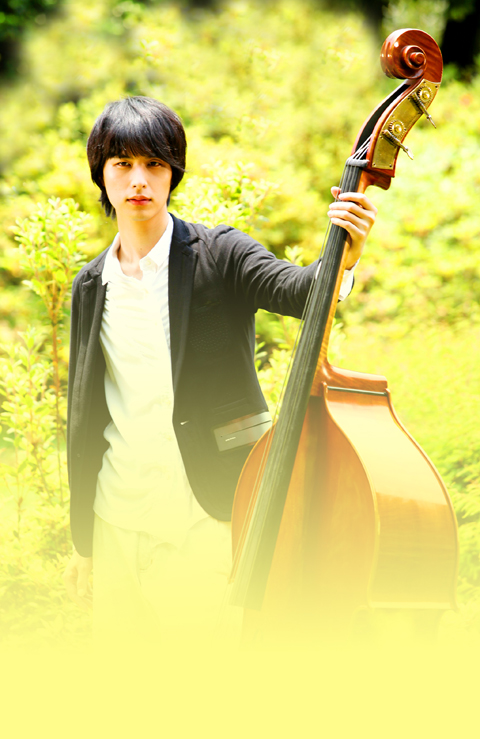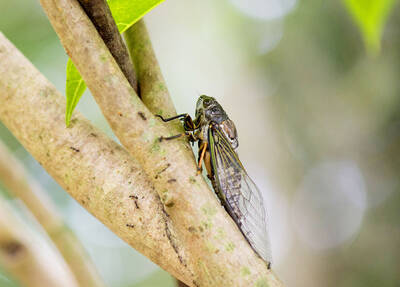Yen-j (嚴爵) is that rare newcomer to the Mando-pop scene who possesses both good looks and talent in spades.
The singer/songwriter and producer’s debut album Thanks Your Greatness (謝謝你的美好) brilliantly combines jazzy flourishes and catchy pop for ebullient musical musings on romance and other meaningful pursuits. It peaked at No. 2 on G-Music’s Mandarin album chart after its release last month and has been lauded by veteran entertainers Dee Hsu (徐熙娣), better known as Little S (小S), and Wang Lee-hom (王力宏). Two tracks became theme songs for TV soap dramas My Queen (敗犬女王) and P.S. Man (偷心大聖PS男).
“I spent 20 months recording this album,” said Yen-j, whose concert tomorrow night at Riverside Cafe (河岸留言) has already sold out. “I went through a period in which I wrote one song per day and I must have accumulated a hundred songs.”

“My label trusts me enough to allow me to produce my own album the first time out. In order to come up with the best result, I re-recorded all the songs numerous times.”
Yen-j performs two sets at Riverside Cafe tomorrow night in an evening titled Yen-j “I Like … No, I Love Yen-j” Concert (嚴爵“我喜歡…不,我愛嚴爵”演唱會) as a warm-up for his first stadium gig, Yen-j 「Endless Beauty Version」 Concert (嚴爵“無限美好版”演唱會), at National Taiwan University’s Sports Center (台大綜合體育館) on July 18. At Riverside, Yen-j will spend one set performing unplugged versions of songs from his album and the next set paying tribute to his idols, who include Jay Chou (周杰倫), Wang Lee-hom, Khalil Fong (方大同) and Stevie Wonder.
A native of Kaohsiung, Yen-j moved to the US to attend school at the age of 10. He took up piano and trombone early on and started performing in San Francisco’s jazz bars with his high school teachers.
“I did not have the typical high school years because I was busy performing,” Yen-j said in an interview earlier this week. “I was lucky to have that opportunity to perform, though.”
After high school, he moved to Los Angeles to study music at the University of Southern California. Already a prolific songwriter with a demo in hand, he made the unusual decision to withdraw from USC after his first semester and move back to Taiwan.
“I figured I would only steer away from the opportunity of becoming a [career] singer if I stay for four years in college,” Yen-j, now 22, explained. “My father was understanding enough to support my decision.”
It took Yen-j only three months to land a record contract. In January this year, he released the EP Trapped in Taipei (困在台北) and embarked on a 44-gig live-house tour throughout the country to cultivate audiences and get used to performing live alone.
“I was a jazz instrumentalist in the beginning and learned to sing later on,” Yen-j said. “Performing live wasn’t that enjoyable in the beginning because I was just learning the ropes. Gradually,
I learned to enjoy it and interact with the audiences.”
Yen-j continues writing songs every day as a way to relieve stress, even during his current hectic promotional schedule.
“Either the beat, some lyrics or a segment of melody would appear, and I continue to finish the song,” he said.
“I have accumulated a whole bunch of songs for the subsequent albums,”
he laughed. “But the label says they won’t listen to the new songs until I finish the promotion and concert [for] the current album.”

For many centuries from the medieval to the early modern era, the island port of Hirado on the northwestern tip of Kyushu in Japan was the epicenter of piracy in East Asia. From bases in Hirado the notorious wokou (倭寇) terrorized Korea and China. They raided coastal towns, carrying off people into slavery and looting everything from grain to porcelain to bells in Buddhist temples. Kyushu itself operated a thriving trade with China in sulfur, a necessary ingredient of the gunpowder that powered militaries from Europe to Japan. Over time Hirado developed into a full service stop for pirates. Booty could

Politically charged thriller One Battle After Another won six prizes, including best picture, at the British Academy Film Awards on Sunday, building momentum ahead of Hollywood’s Academy Awards next month. Blues-steeped vampire epic Sinners and gothic horror story Frankenstein won three awards each, while Shakespearean family tragedy Hamnet won two including best British film. One Battle After Another, Paul Thomas Anderson’s explosive film about a group of revolutionaries in chaotic conflict with the state, won awards for directing, adapted screenplay, cinematography and editing, as well as for Sean Penn’s supporting performance as an obsessed military officer. “This is very overwhelming and wonderful,” Anderson

Social media addiction has been compared to casinos, opioids and cigarettes. While there’s some debate among experts about the line between overuse and addiction, and whether social media can cause the latter, there is no doubt that many people feel like they can’t escape the pull of Instagram, TikTok, Snapchat and other platforms. The companies that designed your favorite apps have an incentive to keep you glued to them so they can serve up ads that make them billions of dollars in revenue. Resisting the pull of the endless scroll, the dopamine hits from short-form videos and the ego boost and validation

The Siberian crane (Leucogeranus leucogeranus) is an exceptionally attractive bird. Mature specimens have snowy white plumage and wingspans well over 200cm. This critically endangered species wasn’t recorded in Taiwan until December 2014, when a juvenile landed in New Taipei City’s Jinshan District (金山), having apparently gotten separated from its flock during a southward migration from the Russian Arctic to Poyang Lake (鄱陽湖) in China. During the crane’s 17-month sojourn, the area’s rice farmers curtailed their use of agrochemicals. A security detail paid for by the local government prevented dogs and photographers from getting too close to the bird. In November 2021, a